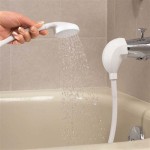Essential Aspects of Step for Bathtub
A step for a bathtub adds convenience and safety to your bathroom, making it easier to get in and out of the tub, especially for young children, elderly individuals, or those with mobility challenges. Choosing the right step stool for your bathroom can enhance accessibility and prevent accidents.
Materials and Durability
Steps for bathtubs are typically made from durable materials such as plastic, metal, or wood. Each material has its advantages and disadvantages:
- Plastic: Lightweight, affordable, and easy to clean, but less sturdy than other materials.
- Metal: Strong, durable, and rust-resistant, but can be heavy and colder to the touch.
- Wood: Warm and aesthetically pleasing, but requires regular maintenance and may not be suitable for humid environments.
Size and Height
The size of the step stool should be appropriate for the height of the bathtub and the user. It should be high enough to allow the user to comfortably step into the tub, but not so high that it becomes unstable or difficult to climb. Most steps range in height from 6 to 12 inches.
Stability and Safety Features
Stability is crucial for safety. Look for steps with a wide base and non-slip feet to prevent slipping or tipping. Some models feature handles or扶手for added support. Additionally, consider steps with a textured surface for better grip.
Weight Capacity
The weight capacity of the step stool should be adequate for the weight of the user. Most steps have a weight capacity of up to 300 pounds, but heavier individuals may require a reinforced or commercial-grade step.
Additional Features
Some steps for bathtubs offer additional features such as:
- Storage compartments: To hold soaps, shampoos, or other bathroom essentials.
- Built-in soap dispensers: For convenience and hygiene.
- Adjustable height: To accommodate different bathtub heights and user needs.
- Antimicrobial surfaces: To reduce the growth of bacteria and mold.
Choosing the Right Step for Bathtub
When selecting a step for your bathtub, consider the following factors:
- Bathtub height: Measure the height of the bathtub to determine the appropriate step height.
- User's needs: Factor in the mobility and weight of the user.
- Bathroom style: Choose a step that complements the aesthetics of your bathroom.
- Safety: Prioritize stability and non-slip features for safe use.
Conclusion
By considering these aspects, you can choose a step for your bathtub that enhances accessibility, safety, and convenience. Remember to maintain your step regularly to ensure its functionality and longevity.

Steps To Your Bathtub Thebath Com

I Would Eventually Love To Redo Our Step Up Tub Into Something Like This Bathrooms Remodel Small Bathroom Makeover

Tiled Bathtub Steps Design Ideas

Tiled Bathtub Steps Design Ideas
Flamingo Ii Step In Bathtub On Free

Tiled Bathtub Steps Design Ideas

Step Up Bathtub Photos Ideas Houzz

18 Gorgeous Step Up Bathroom Design Ideas Style Motivation Ideal Bathrooms Luxury

Safeway Step Bathtub Accessibility Modification

Support Plus Bath Safety Steps








